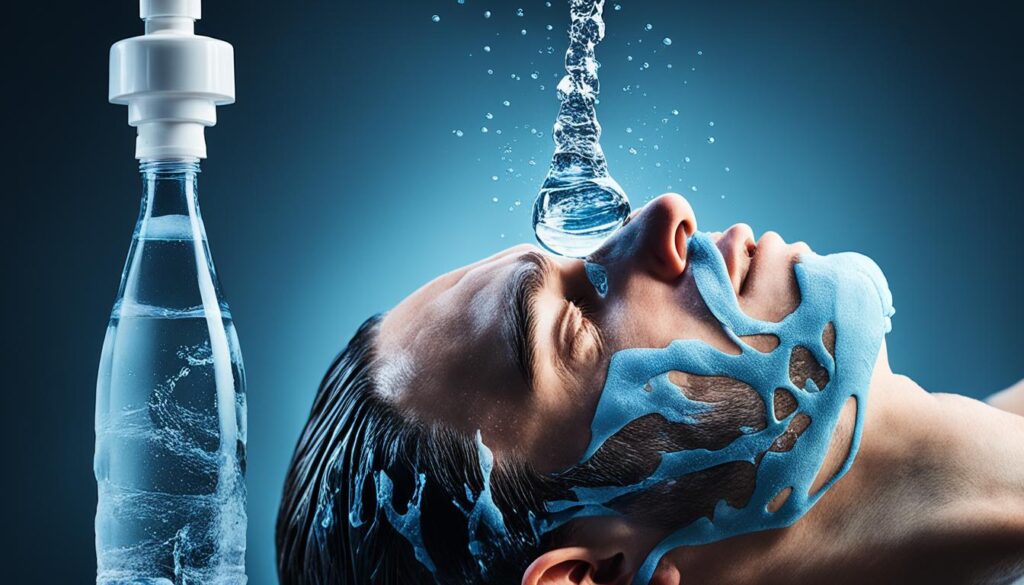As many individuals explore the realms of dietary models to enhance their health, water fasting has emerged as a compelling option, often lauded for its simplicity and the perceived purity of its approach. However, incidents arise where participants question, can water fasting cause headaches? The experience of a headache during a water fast has become a particular point of inquiry among those practicing this form of dietary restraint.
Indeed, the phenomenon of fasting headaches is now recognized as a discomfort that surfaces following sixteen or more hours of abstaining from food, which includes scenarios such as meal omission, intermittent fasting, and spiritual fasting traditions akin to Ramadan. These headaches, which are more akin to a tension sensation rather than a pulsating migraine, often manifest around the forehead and dissipate upon the resumption of food intake, generally within a seventy-two hour period.
While certain factors like hypoglycemia, dehydration, and caffeine withdrawal are commonly cited as potential causes, the specific underlying mechanisms that connect water fasting with the occurrence of headaches remain an area of active exploration. Notably, individuals with a propensity for headaches may find themselves more susceptible to this particular fasting side effect.
Key Takeaways
- Water fasting may lead to headaches, typically felt as a tension around the forehead.
- Fasting-induced headaches are linked to various factors, including hypoglycemia and dehydration.
- Those who frequently experience headaches are more likely to encounter them during a fast.
- Resumption of eating can alleviate fasting headaches within a few days.
- Understanding the causes and potential preventative measures is essential for those undertaking water fasting.
- Hydration and careful management of food intake are crucial to avoiding fasting headaches.
Understanding Water Fasting and Its Popularity
The practice of water fasting taps into the human body’s inherent ability to rejuvenate and repair itself. By abstaining from all forms of caloric intake and consuming only water, individuals embark on a journey aiming to reset and detoxify their system. The allure of water fasting is not new, yet its resurgence in popularity aligns closely with the burgeoning health trends of the present day.
What is Water Fasting?
A staple among various detox and wellness programs, water fasting is defined as a period during which only water is consumed, and no calories are ingested. This purist approach to fasting is typically practiced for 24 hours or longer, with some protocols extending for days. The stark absence of food allows the body to shift its energy focus from digestion to regeneration on a cellular level, an aspect that many believe leads to profound health transformations.
The Rise of Intermittent Fasting and Health Trends
Intertwined with the concept of water fasting is intermittent fasting, a dietary pattern oscillating between intervals of eating and fasting. Its rise to prominence can be attributed to its flexibility and adaptability to different lifestyles. This pattern of eating not only appeals to those seeking weight loss but also to those endeavoring to enhance their metabolic health, foster longevity, and protect against diseases.
Benefits and Risks Associated with Water Fasting
While the benefits of water fasting are hailed by many—ranging from weight loss to improved blood sugar regulation—the practice is not without potential side effects. A table comparing the benefits and side effects, such as water fasting headaches and dehydration, provides a clear picture for those considering this fasting method.
| Benefit | Potential Side Effect |
|---|---|
| Weight Loss | Headaches |
| Reduced Inflammation | Dehydration |
| Improved Metabolism | Electrolyte Imbalance |
| Enhanced Cellular Repair | Muscle Cramps or Weakness |
| Lowered Blood Sugar Levels | Hypoglycemia |
Despite these benefits, the side effects of water fasting need to be carefully considered, especially for those with pre-existing health conditions or special dietary requirements. Headaches remain one of the most frequently reported issues among individuals participating in intermittent fasting programs, particularly in the early stages. It is essential to stay well-hydrated and to gradually ease into any fasting practice to mitigate risks and to fully reap the potential health benefits.
Can Water Fasting Cause Headaches?
The act of abstaining from food through water fasting is gaining traction as a method to promote health and detoxify the body. However, with the embrace of fasting, the emergence of headache from fasting has raised concerns and questions among the fasting community. Research indicates that altering one’s regular dietary intake by water fasting can impact the equilibrium of the body’s natural processes, potentially leading to headaches.
Several factors contribute to the occurrence of fasting headaches. Among them, dehydration headache appears to be a common complaint. These headaches, often described as a band-like tension around the forehead, do not pulsate and present themselves after significant duration of not consuming food. It’s noteworthy that individual resilience to fasting headaches varies considerably, influenced by factors such as overall health, the method of fasting employed, and one’s history of headaches.
Symptoms typically begin after the individual has not eaten for a specific number of hours and can persist until nourishment is reintroduced. The pattern and intensity of these headaches can be likened to those experienced during tension headaches, suggesting that physical stress may be at play. Even as fasting continues to be practiced for its benefits, it’s crucial to understand and address causes such as blood sugar fluctuations, stress, withdrawal from caffeine, and insufficient hydration.

| Contributing Factor | Common Effects | Possible Remedies |
|---|---|---|
| Dehydration | Headache, Dry Mouth, Thirst | Increase Water Intake, Electrolyte Supplementation |
| Hypoglycemia | Headache, Dizziness, Weakness | Gradual Fasting Introduction, Monitoring Blood Sugar Levels |
| Caffeine Withdrawal | Headache, Irritability, Fatigue | Gradual Reduction of Caffeine, Substitution with Caffeine-free Alternatives |
| Stress | Headache, Anxiety, Tension | Relaxation Techniques, Adequate Rest, Mindfulness Practices |
It’s noteworthy that the fasting community suggests a hydration-focused approach to alleviate dehydration headaches amidst a fast. With regard to preventing headaches while fasting, such strategies reflect a proactive stance to maintain wellness, even as individuals seek to harness the benefits of dietary abstention. As the discourse continues to evolve, the understanding of the link between water fasting and headaches expands, forging pathways to more informed and supportive fasting experiences.
Identifying the Causes of Headaches During Water Fasting
Headaches are a common side effect of water fasting, often leading those on a fasting journey to seek out the root causes of this discomfort. Understanding the triggers is essential to manage and hopefully prevent these headaches. Let’s delve into the role of hypoglycemia, dehydration, and caffeine withdrawal, which are commonly implicated in the onset of headaches during fasting.
The Role of Hypoglycemia in Fasting Headaches
One primary suspect in the case of fasting-induced headaches is hypoglycemia, characterized by lower than normal blood sugar levels. When the body transitions into a fasted state, the lack of food intake can lead to a natural decline in blood sugar levels, creating an environment where headaches can arise as the brain signals for fuel.
Dehydration: A Key Factor in Headache Development
Another major factor contributing to headaches is dehydration headache. As individuals abstain from not just food, but often also decrease their fluid intake, the body may experience dehydration – a condition that can manifest as a headache, among other symptoms.
Caffeine Withdrawal and Its Impact on the Body
Many experience the throes of a caffeine withdrawal headache as they fast, particularly if their routine includes regular consumption of caffeine-containing beverages. This withdrawal can share characteristics with fasting headaches, making it a challenging discomfort to overcome during periods of food abstinence.
Considering these factors collectively, it becomes clear how the body’s response to a change in regular eating patterns, such as those during water fasting, can precipitate headaches. The intertwined nature of hypoglycemia, dehydration, and caffeine withdrawal can create a perfect storm for triggering headaches, emphasizing the need for a mindful approach to fasting routines.
Preventative Measures to Avoid Headaches While Fasting
Embarking on a fasting journey can be a transformative experience for health and wellness, yet it’s not without its challenges—one of which is the fasting headache. Understanding how to prevent headache while fasting is essential for a successful and comfortable fast. There is a multitude of strategies individuals can adopt to reduce the likelihood of experiencing headaches, ranging from hydration techniques to the management of blood sugar levels. These strategies foster not only headache relief during a water fast but also a more positive fasting experience overall.
Staying Hydrated: Tips for Effective Water Intake
One critical element in the prevention of headaches while fasting is proper hydration. Fasting individuals are encouraged to monitor their water intake closely, ensuring they consume sufficient fluids to avoid the adverse effects of dehydration. Here are some tips for staying hydrated:
- Drink water consistently throughout the day, rather than all at once, to maintain hydration levels.
- Consider the inclusion of electrolytes, as they can assist in balancing the body’s hydration and support vital functions.
- Listen to your body’s cues, such as thirst and dry mouth, which signal the need for more fluids.
- Avoid beverages that may contribute to dehydration, such as those with alcohol or high caffeine content.
Managing Blood Sugar Levels During Fasts
Maintaining stable blood sugar levels is another tactic to prevent headaches while fasting. Symptoms of hypoglycemia, like shakiness and dizziness, can be early indicators of a pending headache and serve as a reminder to take appropriate action. Strategies to manage blood sugar levels include:
- Initiating a gradual approach to fasting to allow the body to better adapt without triggering a headache response.
- Being prepared with a small, ready-to-consume snack or sugary beverage in case symptoms of low blood sugar arise.
- Mindful timing of the last meal before the fast to ensure it contains a balance of macronutrients for sustained energy release.
Engaging in stress-relieving activities and a mindful reduction of caffeine intake can also play supportive roles in the prevention of fasting headaches. Should individuals encounter severe or persistent headaches, it is critical to consult with healthcare professionals to navigate these concerns safely.

| Strategy | Benefit | How to Implement |
|---|---|---|
| Consistent Hydration | Prevents dehydration-induced headaches | Consume water throughout the day; add electrolytes if necessary |
| Gradual Fasting Introduction | Allows the body to adapt gently, reducing shock | Start with shorter fasts and incrementally extend the duration |
| Balanced Pre-Fast Meals | Ensures steady glucose levels entering the fast | Include a mix of protein, fats, and complex carbohydrates in the last meal |
| Monitoring for Hypoglycemia | Quick response to low blood sugar symptoms | Recognize signs and have a small snack or drink at hand if needed |
| Stress Management | Reduces potential headache triggers from fasting-induced stress | Incorporate techniques like deep breathing, meditation, or gentle exercise |
| Caffeine Intake Reduction | Minimizes withdrawal symptoms that can cause headaches | Gradually lower caffeine use before starting the fast |
When to Seek Medical Attention for Fasting-Induced Headaches
While engaging in a water fast, many individuals may experience a headache as a normal response of the body adjusting to the lack of food intake. However, awareness about headache after water fasting is essential, as there are circumstances when such discomfort warrants medical attention. It is crucial to differentiate between a typical fasting headache and signs of a more serious issue.
Recognizing the Signs of Severe Headaches
Typically, a fasting headache will be mild to moderate in intensity and cease after a meal. In contrast, signs of a severe headache can include an unusually intense pain, visual disturbances such as aura, dizziness, confusion, or those that do not subside even after breaking the fast. Such symptoms should not be ignored, as they could indicate more serious underlying conditions, not just the fasting side effects.
The Importance of Monitoring Health During Fasting
Undertaking a monitored fasting routine is key to ensuring safety and health during this period. Individuals must be vigilant in monitoring fasting side effects, paying close attention to any changes in their health. Should warning signs such as persistent headaches arise, it’s recommended to promptly seek medical counsel to address potential health issues.
Health monitoring during a fast should include acknowledging current health conditions and being prepared to act if symptoms intensify. Staying attuned to your body’s signals can help mitigate risks associated with fasting.
In summary, while fasting is known for its potential health benefits, it’s essential to understand and recognize when headaches or other symptoms may suggest the need for professional advice. Continual self-awareness and professional medical evaluations may be vital components of a responsible fasting regimen.
Conclusion
Throughout this exploration of water fasting headaches, it’s evident that while the practice of fasting, particularly water fasting, promulgates numerous health benefits, its association with headaches underscores a need for mindful management. Hypoglycemia, dehydration, and caffeine withdrawal surface prominently as catalysts of these discomforts, revealing an area requiring proactive measures. Individuals vested in the benefits of fasting are encouraged to navigate this territory with strategies aimed at easing fasting side effects.
Key to managing fasting headaches lies in the essential practices of adequate hydration, gradual transition into fasting routines, and attentive blood sugar monitoring. Such measures not only abate the headaches but contribute to a more positive fasting experience. Moreover, incorporating stress management into one’s routine likewise serves to enhance the fasting journey. For those encountering sustained or intense headaches, seeking advice from healthcare professionals remains a prudent course of action.
In summation, with the right approach and an informed understanding of potential side effects and their remedies, many can engage in intermittent fasting, receiving its health rewards while minimizing adverse effects. Thus, water fasting and other forms of dietary fasting can be upheld as viable lifestyle changes for those it suits, so long as they remain cognizant of their body’s signals and the importance of easing fasting side effects through proactive management.




